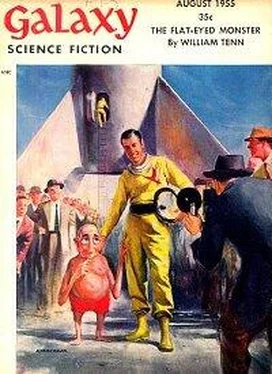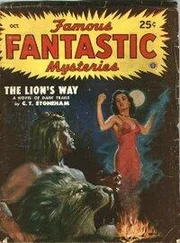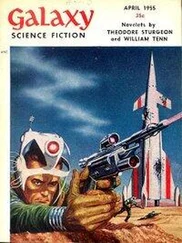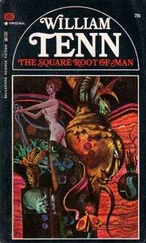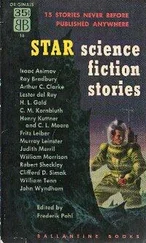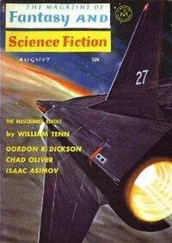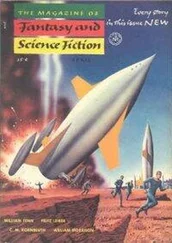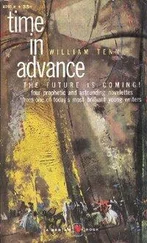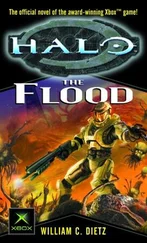William Tenn - The Flat-Eyed Monster
Здесь есть возможность читать онлайн «William Tenn - The Flat-Eyed Monster» весь текст электронной книги совершенно бесплатно (целиком полную версию без сокращений). В некоторых случаях можно слушать аудио, скачать через торрент в формате fb2 и присутствует краткое содержание. Год выпуска: 1955, Издательство: Galaxy Publishing Corporation, Жанр: Фантастика и фэнтези, на английском языке. Описание произведения, (предисловие) а так же отзывы посетителей доступны на портале библиотеки ЛибКат.
- Название:The Flat-Eyed Monster
- Автор:
- Издательство:Galaxy Publishing Corporation
- Жанр:
- Год:1955
- ISBN:нет данных
- Рейтинг книги:5 / 5. Голосов: 1
-
Избранное:Добавить в избранное
- Отзывы:
-
Ваша оценка:
- 100
- 1
- 2
- 3
- 4
- 5
The Flat-Eyed Monster: краткое содержание, описание и аннотация
Предлагаем к чтению аннотацию, описание, краткое содержание или предисловие (зависит от того, что написал сам автор книги «The Flat-Eyed Monster»). Если вы не нашли необходимую информацию о книге — напишите в комментариях, мы постараемся отыскать её.
The Flat-Eyed Monster — читать онлайн бесплатно полную книгу (весь текст) целиком
Ниже представлен текст книги, разбитый по страницам. Система сохранения места последней прочитанной страницы, позволяет с удобством читать онлайн бесплатно книгу «The Flat-Eyed Monster», без необходимости каждый раз заново искать на чём Вы остановились. Поставьте закладку, и сможете в любой момент перейти на страницу, на которой закончили чтение.
Интервал:
Закладка:
The Flat-Eyed Monster
by William Tenn
For the first few moments, Clyde Manship—who up to then had been an assistant professor of Comparative Literature at Kelly University—for the first few moments, Manship tried heroically to convince himself that he was merely having a bad dream. He shut his eyes and told himself chidingly, with a little superior smile playing about his lips, that things as ugly as this just did not occur in real life. No. Definitely a dream.
He had himself half convinced, until he sneezed. It was too loud and wet a sneeze to be ignored. You didn’t sneeze like that in a dream—if you sneezed at all. He gave up. He’d have to open his eyes and take another look. At the thought, his neck muscles went rigid with spasm.
A little while ago, he’d fallen asleep while reading an article he’d written for a scholarly journal. He’d fallen asleep in his own bed in his own apartment in Callahan Hall—“a charming and inexpensive residence for those members of the faculty who are bachelors and desire to live on campus.” He’d awakened with a slightly painful tingling sensation in every inch of his body. He felt as if he were being stretched, stretched interminably and—and loosened. Then, abruptly, he had floated off the bed and gone though the open window like a rapidly attenuating curl of smoke. He’d gone straight up to the star-drenched sky of night, dwindling in substance until he lost consciousness completely.
And had come to on this enormous flat expanse of white tabletop, with a multivaulted ceiling above him and dank, barely breathable air in his lungs. Hanging from the ceiling were quantities and quantities of what was indubitably electronic equipment, but the kind of equipment the boys in the Physics Department might dream up, if the grant they’d just received from the government for military radiation research had been a million times larger than it was, and if Professor Bowles, the department head, had insisted that every gadget be carefully constructed to look substantially different from anything done in electronics to date.
The equipment above him had been rattling and gurgling and whooshing, glowing and blinking and coruscating. Then it had stopped as if someone had been satisfied and had turned off a switch.
So Clyde Manship had sat up to see who had turned it off.
He had seen all right.
He hadn’t seen so much who as he had seen what. And it hadn’t been a nice what. In fact, none of the whats he had glimpsed in that fast look around had been a bit nice. So he had shut his eyes fast and tried to find another mental way out of the situation.
But now he had to have another look. It might not be so bad the second time. “It’s always darkest,” he told himself with determined triteness, “before the dawn.” And then found himself involuntarily adding, “except on days when there’s an eclipse.”
But he opened his eyes anyway, wincingly, the way a child opens its mouth for the second spoonful of castor oil.
Yes, they were all as he had remembered them. Pretty awful.
The tabletop was an irregular sort of free-form shape, bordered by thick, round knobs a few inches apart. And perched on these knobs, about six feet to the right of him, were two creatures who looked like black leather suitcases. Instead of handles or straps, however, they sported a profusion of black tentacles, dozens and dozens of tentacles, every second or third one of which ended in a moist turquoise eye shielded by a pair of the sweepingest eyelashes Manship had ever seen outside of a mascara advertisement.
Embedded in the suitcase proper, as if for additional decorative effect, were swarms of other sky-blue eyes, only these, without eyelashes, bulged out in multitudes of tiny, glittering facets like enormous gems. There was no sign of ear, nose or mouth anywhere on the bodies, but there was a kind of slime, a thick, grayish slime, that oozed out of the black bodies and dripped with a steady splash-splash-splash to the floor beneath.
On his left, about fifteen feet away, where the tabletop extended a long peninsula, there was another one of the creatures. Its tentacles gripped a pulsating spheroid across the surface of which patches of light constantly appeared and disappeared.
As near as Manship could tell, all the visible eyes of the three were watching him intently. He shivered and tried to pull his shoulders closer together.
“Well, Professor,” someone asked suddenly, “what would you say?”
“I’d say this was one hell of a way to wake up,” Manship burst out, feelingly. He was about to go on and develop this theme in more colorful detail when two things stopped him.
The first was the problem of who had asked the question. He had seen no other human—no other living creature, in fact—besides the three tentacled suitcases anywhere in that tremendous, moisture-filled room.
The second thing that stopped him was that someone else had begun to answer the question at the same time, cutting across Manship’s words and ignoring them completely.
“Well, obviously,” this person said, “the experiment is a success. It has completely justified its expense and the long years of research behind it. You can see for yourself, Councilor Glomg, that one-way teleportation is an accomplished fact.”
Manship realized that the voices were coming from his right. The wider of the two suitcases—evidently “the professor” to whom the original query had been addressed—was speaking to the narrower one, who had swung most of his stalked eyes away from Manship and had focused them on his companion. Only where in blazes were the voices coming from? Somewhere inside their bodies? There was no sign anywhere of vocal apparatus.
AND HOW COME, Manship’s mind suddenly shrieked, THEY TALK ENGLISH?
“I can see that,” Councilor Glomg admitted with a blunt honesty that became him well. “It’s an accomplished fact, all right, Professor Lirld. Only, what precisely has it accomplished?”
Lirld raised some thirty or forty tentacles in what Manship realized fascinatedly was an elaborate and impatient shrug. “The teleportation of a living organism from astronomical unit 649-301-3 without the aid of transmitting apparatus on the planet of origin”
The Councilor swept his eyes back to Manship. “You call that living?” he inquired doubtfully.
“Oh, come now, Councilor,” Professor Lirld protested. “Let’s not have any flefnomorphism. It is obviously sentient, obviously motile, after a fashion—”
“All right. It’s alive. I’ll grant that. But sentient? It doesn’t even seem to pmbff from where I stand. And those horrible lonely eyes! Just two of them—and so flat! That dry, dry skin without a trace of slime. I’ll admit that—”
“You’re not exactly a thing of beauty and a joy forever yourself, you know,” Manship, deeply offended, couldn’t help throwing out indignantly.
“—I tend to flemomorphism in my evaluation of alien life-forms,” the other went on as if he hadn’t spoken. “Well, I’m a flefnobe and proud of it. But after all, Professor Lirld, I have seen some impossible creatures from our neighboring planets that my son and other explorers have brought back. The very strangest of them, the most primitive ones, at least can pmbff! But this—this thing. Not the smallest, slightest trace of a pmb do I see on it! It’s eerie, that’s what it is—eerie!”
“Not at all,” Lirld assured him. “It’s merely a scientific anomaly. Possibly in the outer reaches of the galaxy where animals of this sort are frequent, possibly conditions are such that pmbffing is unnecessary. A careful examination should tell us a good deal very quickly. Meanwhile, we’ve proved that life exists in other areas of the galaxy than its sun-packed core. And when the time comes for us to conduct exploratory voyages to these areas, intrepid adventurers like your son will go equipped with information. They will know what to expect.”
Читать дальшеИнтервал:
Закладка:
Похожие книги на «The Flat-Eyed Monster»
Представляем Вашему вниманию похожие книги на «The Flat-Eyed Monster» списком для выбора. Мы отобрали схожую по названию и смыслу литературу в надежде предоставить читателям больше вариантов отыскать новые, интересные, ещё непрочитанные произведения.
Обсуждение, отзывы о книге «The Flat-Eyed Monster» и просто собственные мнения читателей. Оставьте ваши комментарии, напишите, что Вы думаете о произведении, его смысле или главных героях. Укажите что конкретно понравилось, а что нет, и почему Вы так считаете.
